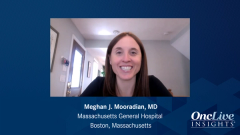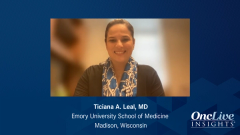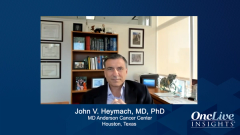
Immunotherapy in NSCLC With Concomitant KRAS/STK11 or KRAS/KEAP1 Mutations
Moving on to the KRAS/STK11 and KRAS/KEAP1 setting of non–small cell lung cancer, Ticiana Leal, MD, discusses the lack of benefit seen with immunotherapy approaches.
Episodes in this series

Transcript:
Ticiana A. Leal, MD: There are also some other interesting data coming out from our clinical trials about the role of immunotherapy in non–small cell lung cancer for patients with comutations with KRAS and STK11, or KRAS and KEAP1. Some of the questions that have come up about the role of PD-1 and PD-L1 inhibitors in the treatment of non–small cell lung cancer with STK11 or KEAP1 mutations are that there has been a concern based on studies that have been done. Initially, a retrospective study using 4 cohorts with chemotherapy and immunotherapy combination showed reduced efficacy of immunotherapy in patients with KRAS and STK11 or KRAS and KEAP1 mutations. And the difference was significant, with reduced progression-free survival as well as overall survival. In addition, there was another large cohort study that showed poor outcomes with immunotherapy in non–small cell lung cancer that had comutations with KRAS and STK11 or KRAS and KEAP1.
We identify KRAS mutations when we do that broad-based next-generation sequencing [NGS] panel at initial diagnosis. Also, within that panel, depending on what panel you’re using, STK11 and KEAP1 mutations can be identified in the next-generation sequence-testing panel as well. That is certainly something that we look for when we do the NGS test and we look at the report. I think it is important to look for these mutations, both STK11 and KEAP1 mutations, when they are seen especially in combination with KRAS mutations, as we saw, they do seem to confer a worse outcome for patients. I think it’s important that we know that up front as we initiate patients on their treatments. Now, one of the challenges is we still don’t have an optimal treatment option that can modify and improve that outcome for patients with STK11 and KEAP1, and there are ongoing trials looking at that question.
For the time being, the presence of the STK11 and KEAP1 mutations has not changed my treatment choice for initial therapy for patients with non–small cell lung cancer. But I’m certainly very aware of these results and interested in looking at clinical trial options for my patients when there is one available, and when the patient obviously is also interested in that approach.
There are ongoing clinical trials. There’s an interesting clinical trial through Lung-MAP, where sotorasib is provided for patients who have a KRAS mutation. We are looking at specific cohorts, including STK11 and so on, to try to see the differential effect prospectively, so more to come on that. I’m not aware of any trials that are stratifying patients based on the comutations of KRAS and STK11 or KRAS and KEAP1, but there are a lot of studies being reported that will provide us some retrospective analysis of the significance and impact of these comutations in patients and their outcomes.
Transcript edited for clarity.







































